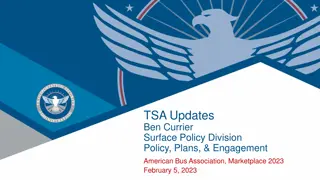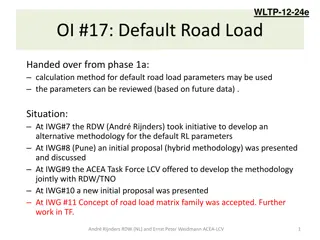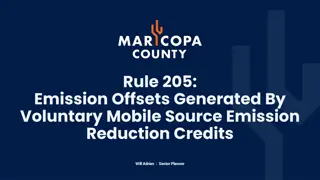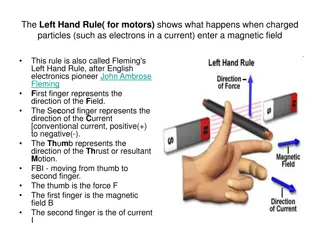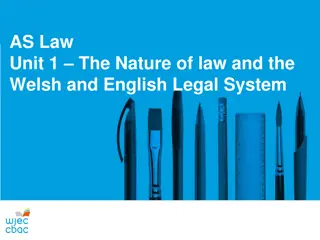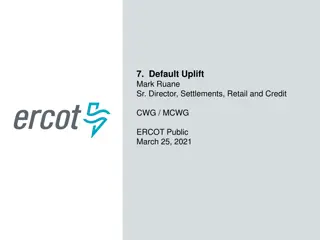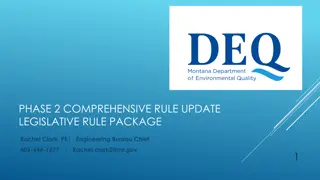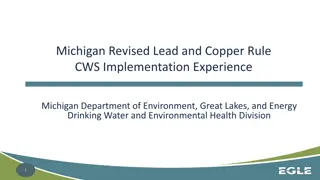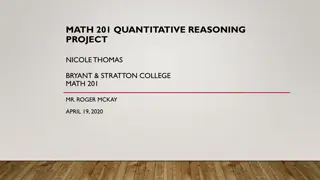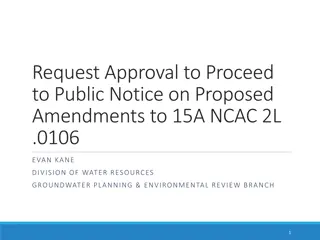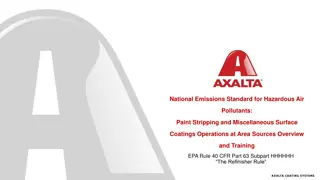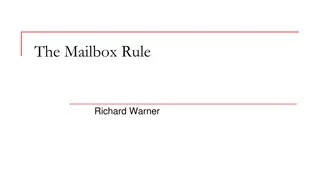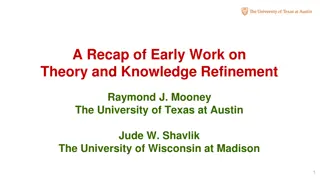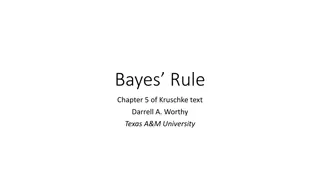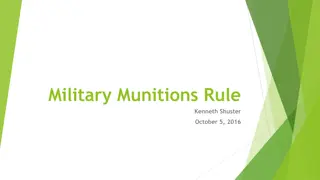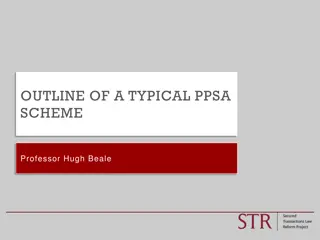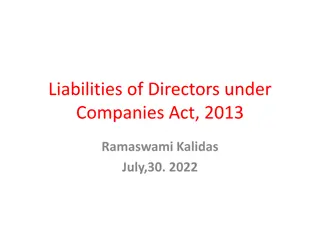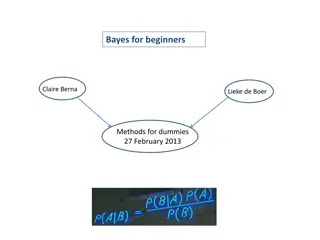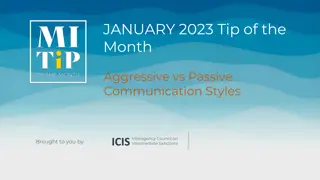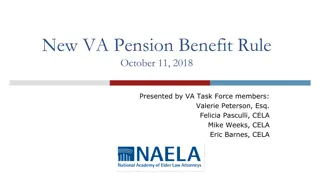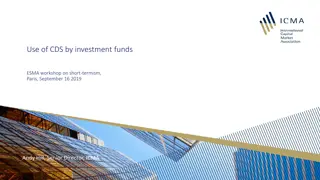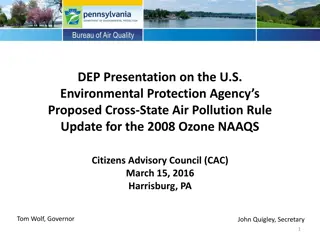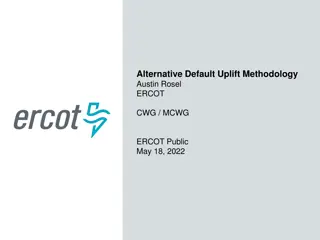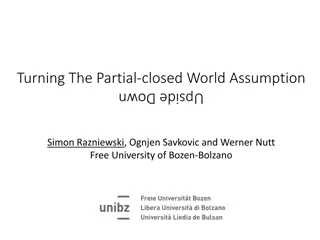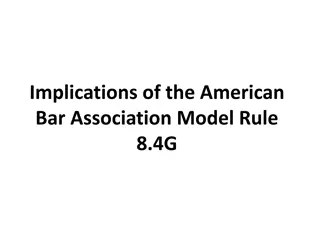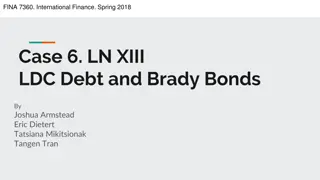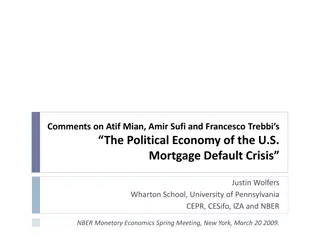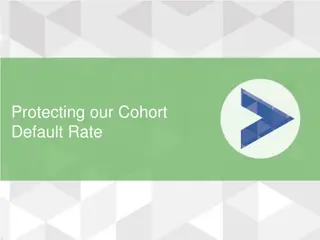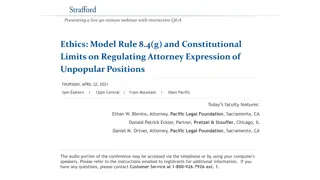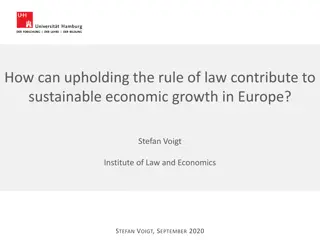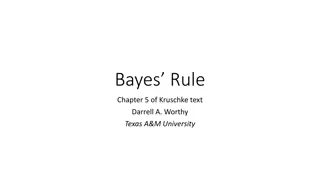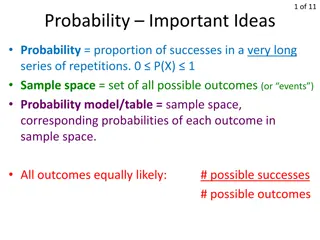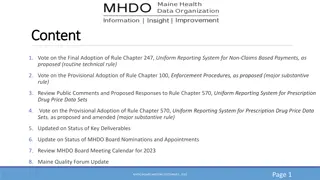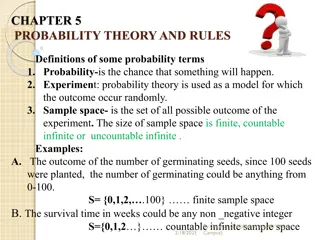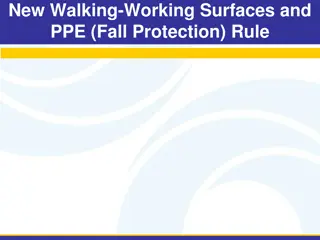Emergency Response Proposed Rule - Worker Safety and Health Conference
The Emergency Response Proposed Rule aims to update regulations for worker safety and health, expanding coverage to include technical search and rescue and emergency medical service entities. The rule proposes replacing the existing Fire Brigades standard with an Emergency Response standard. Federal
3 views • 23 slides
Pascal's Rule in NMR Spectroscopy ( n+1 )
Pascal's Rule in NMR spectroscopy, also known as the (N+1) rule, is an empirical rule used to predict the multiplicity and splitting pattern of peaks in 1H and 13C NMR spectra. It states that if a nucleus is coupled to N number of equivalent nuclei, the multiplicity of the peak is N+1. The rule help
2 views • 30 slides
TSA Updates on Security Training Rule for OTRB Companies
In the recent updates by TSA, the Security Training Rule for over-the-road bus (OTRB) companies has been highlighted. The rule mandates TSA-approved security training for employees in security-sensitive roles, emphasizing key requirements and elements of security training. Urban areas covered by the
1 views • 18 slides
- Development of Alternative Methodology for Default Road Load Parameters in Vehicle Testing
- The initiative to develop an alternative methodology for default road load parameters in vehicle testing was led by RDW and ACEA. The process involved multiple meetings, discussions, and proposals, resulting in the acceptance of the concept of a road load matrix family. Various x-factors were adop
3 views • 22 slides
Compliance Guide for Rule 205: Emission Offsets & Mobile Source Credits
Rule 205 outlines the process for generating emission offsets through voluntary mobile source emission reduction credits in Maricopa County. The rule-making process, state implementation plan submission, and permit conditions related to Rule 205 are discussed. The preparation for compliance includes
0 views • 7 slides
Fleming's Left Hand Rule and Electric Motors
Fleming's Left Hand Rule, also known as the Left Hand Rule for Motors, explains the interaction between charged particles and magnetic fields. Electric motors utilize this principle to convert electrical energy into mechanical energy through the interaction of magnetic fields and current-carrying co
3 views • 6 slides
The Rule of Law and Legal Systems in Wales and England
The content discusses the nature of law, the Welsh and English legal systems, and the Rule of Law doctrine. It includes observations from the 2019 AS Law Unit 1 examination, emphasizing the importance of adhering to rubrics and answering questions clearly. Candidates faced challenges with timing and
0 views • 14 slides
Recovery of Willful Default in Mortgages through NAB
This content discusses the National Accountability Ordinance (NAO) of 1999 and the concept of willful default in the context of mortgages. It covers the need for recovery, the definition of default, and key definitions outlined in NAO. The focus is on eradicating corruption and holding individuals a
1 views • 40 slides
ERCOT Default Uplift and Payment Procedures
ERCOT's default uplift and payment procedures involve handling short-paying invoice recipients, implementing payment plans, and collecting total short pay amounts from QSEs and CRRAHs. Default uplift invoices may be issued after 90 days of a short pay, with a maximum cap of $2.5 million per monthly
0 views • 7 slides
Phase 2 Comprehensive Rule Update Legislative Rule Package Overview
Seven subdivision bills were adopted during the 2023 session, covering various topics such as independent reviewers, cut and fill systems, connection to public sewer systems, and more. The public comment period and hearing are scheduled, with the draft rule to respond to comments by August 25. A bil
4 views • 17 slides
Router Routing Tables in Computer Networks
Router routing tables are crucial for directing packets to their destination networks. These tables contain information on directly connected and remote networks, as well as default routes. Routers use this information to determine the best path for packet forwarding based on network/next hop associ
0 views • 48 slides
Corporate Bond Ratings and Credit Risk in International Finance
Corporate bond ratings provide signals on default probability, impacting borrowing costs. Higher ratings signify lower risk and interest rates. Credit spreads measure the difference between risky bonds and risk-free assets, with risk-free assets like US Treasury bonds seen as default-free. The longe
1 views • 19 slides
Michigan Revised Lead and Copper Rule Implementation Experience
The Michigan Department of Environment, Great Lakes, and Energy shares insights on the implementation of the Michigan Revised Lead and Copper Rule. Key topics include rule revisions, data outcomes, challenges, and development drivers. The rule aims to reduce lead levels, update sampling protocols, a
0 views • 26 slides
Student Loan Default and Repayment Strategies
Exploring the consequences of defaulting on student loans, the importance of timely repayment, and the potential options for managing student loan debt. The article delves into the processes of loan default, implications of non-repayment, and considerations for avoiding financial pitfalls associated
2 views • 13 slides
Groundwater Contamination Rule Amendments Proposal
Proposed amendments to NCAC 15A.2L.0106 focus on establishing default cleanup requirements for groundwater contamination and providing options for remediation. The amendments aim to clarify compliance boundaries, correct terminology inconsistencies, and enhance rule effectiveness.
0 views • 8 slides
EPA Rule 40 CFR Part 63 Subpart HHHHHH Overview
EPA Rule 40 CFR Part 63 Subpart HHHHHH, also known as The Refinisher Rule, sets standards for hazardous air pollutants in paint stripping and surface coatings operations. The rule aims to control emissions of target hazardous air pollutants in collision centers and surrounding areas. It outlines req
1 views • 20 slides
The Mailbox Rule in Contract Law
The Mailbox Rule, a common law principle, stipulates that acceptance of an offer is valid when dispatched, providing certainty in contract formation. This rule is illustrated through scenarios involving delays in mail delivery and parties' need for assurance in contractual agreements. The examples h
0 views • 14 slides
Evolution of Theory and Knowledge Refinement in Machine Learning
Early work in the 1990s focused on combining machine learning and knowledge engineering to refine theories and enhance learning from limited data. Techniques included using human-engineered knowledge in rule bases, symbolic theory refinement, and probabilistic methods. Various rule refinement method
0 views • 12 slides
Bayes Rule and Its Historical Significance
Bayes Rule, a fundamental theorem in statistics, helps in updating probabilities based on new information. This rule involves reallocating credibility between possible states given prior knowledge and new data. The theorem was posthumously published by Thomas Bayes and has had a profound impact on s
0 views • 34 slides
History and Implementation of Military Munitions Rule
The history and implementation of the Military Munitions Rule, including its origins in regulations like RCRA and FFCA, the involvement of key stakeholders, identification of issues in rulemaking, and ensuring safe transportation and storage of hazardous waste. The process involved extensive consult
0 views • 26 slides
A Typical PPSA Scheme by Professor Hugh Beale
This comprehensive outline delves into the key aspects of a typical PPSA scheme, covering creation, attachment, perfection, registration, priority issues, rights and duties pre-default, remedies on default, and more. It explores the scope of application, quasi-securities, registration of similar-loo
0 views • 16 slides
Liabilities of Directors under Companies Act, 2013
Director's liabilities under the Companies Act, 2013 include definitions of directors, shadow directors, officers, and those in default. Responsibility for default and potential prosecutions for wrongful actions are discussed. Changes in definitions and concepts are highlighted to illustrate the leg
0 views • 37 slides
Introduction to Bayes' Rule: Understanding Probabilistic Inference
An overview of Bayes' rule, a fundamental concept in probabilistic inference, is presented in this text. It explains how to calculate conditional probabilities, likelihoods, priors, and posterior probabilities using Bayes' rule through examples like determining the likelihood of rain based on a wet
0 views • 21 slides
Aggressive vs. Passive Communication Styles in Cognitive Behavioral Therapy
Explore the impact of communication styles on outcomes in cognitive behavioral therapy. Learn to identify default communication styles and strategies to promote assertive communication. Discover the benefits of replacing default styles with assertiveness for better interpersonal interactions.
0 views • 4 slides
The New VA Pension Benefit Rule of October 11, 2018
VA Task Force members presented key changes in the VA pension benefit rule, focusing on net worth limits, transfer rules, exclusions, look-back periods, and penalties. The rule aims to uphold program integrity and align with GAO recommendations, impacting eligibility criteria for applicants. Key sec
11 views • 55 slides
Use of Credit Default Swaps (CDS) by Investment Funds
Presentation at the ESMA workshop discussed the potential benefits and costs of using Credit Default Swaps (CDS) by investment funds. It highlighted the various uses of CDS, including risk management, alternative liquidity, and investment strategies. Evidence shows that a small percentage of UCITS f
0 views • 6 slides
U.S. EPA's Proposed Cross-State Air Pollution Rule Update for 2008 Ozone NAAQS
The U.S. Environmental Protection Agency (EPA) issued the Cross-State Air Pollution Rule (CSAPR) in 2011, aiming to improve air quality by reducing power plant emissions across state lines. Challenges and subsequent revisions led to the proposed CSAPR Update Rule in 2015, targeting interstate air po
0 views • 27 slides
Analysis of Default Uplift Methodology Changes in ERCOT
This document delves into the impact of changes to the Default Uplift Methodology in ERCOT, focusing on the removal of CRR Auction activity and the multiplication of CRRs owned. It explores scenarios with varying multipliers at different levels, revealing potential implications for QSEs, CRRAHs, and
0 views • 10 slides
Modeling Complete and Incomplete Data in Database Systems
The discussion revolves around the partial-closed world assumption, contrasting incompleteness as default (IAD) with completeness as default (CAD). It delves into querying completeness reasoning, translating between CAD and IAD, and the implications of using IAD over CAD in database modeling. Variou
1 views • 13 slides
Implications of ABA Model Rule 8.4(g) on Professional Conduct
The American Bar Association's Model Rule 8.4(g) addresses professional misconduct in legal practice related to discrimination and harassment based on various factors. The rule has been adopted by some states, sparking discussions on its implications and challenges within the legal community. Explor
0 views • 67 slides
Brady Bonds and Valuation Methodologies in International Finance
Exploring Brady Bonds introduced by Nicholas Brady in response to default crises in Latin American countries, focusing on valuation methodology, country ratings, and decision-making on purchasing Par or Discount Bonds in Mexico and Venezuela. Topics include cash flows, probability of default, discou
0 views • 14 slides
Analysis of Political and Economic Factors in the U.S. Mortgage Default Crisis
This research paper by Justin Wolfers delves into the correlations between voting patterns, constituent interests, and economic conditions amidst the U.S. Mortgage Default Crisis. It highlights how legislators respond to constituent interests, including voting for bills that impact mortgage default
0 views • 24 slides
Cohort Default Rates in Federal Student Loans
This document discusses the importance of protecting the cohort default rate in educational institutions for financial well-being of students and safeguarding federal funding. It explains the cohort default rate equation and provides insights into the cohort year 2013 data. The visuals and informati
0 views • 26 slides
Ethics & Constitutional Limits on Attorney Expression Webinar
Join the live 90-minute webinar on Ethics: Model Rule 8.4(g) and Constitutional Limits on Regulating Attorney Expression of Unpopular Positions featuring expert faculty members. Explore regulations governing lawyer speech and the requirements for lawyer communication in various contexts. Learn about
0 views • 57 slides
Upholding the Rule of Law for Sustainable Economic Growth in Europe
Democracy and the rule of law are essential for sustained economic growth in Europe. The rule of law ensures stable and impartial enforcement of rules such as property rights and contract law, key for market economies. Upholding the rule of law is crucial for combating corruption and maintaining a f
1 views • 6 slides
Bayes’ Rule
Bayes Rule, a fundamental concept in statistics, explores how prior beliefs are updated based on new evidence. This rule, named after Thomas Bayes, has had a profound impact on statistical inference and has been further developed by mathematicians like Laplace. Exploring the probabilistic reasoning
0 views • 34 slides
Probability: Key Concepts and Rules
Probability is the proportion of successes in a long series of repetitions. Important ideas include the 0-1 Rule, the 100% Rule, the Complement Rule, the Addition Rule, and the Multiplication Rule. These rules govern the calculation of probabilities in various scenarios. Learn the fundamental princi
0 views • 16 slides
MHDO Board Meeting Summary - Rule Adoption and Public Comments Review
The MHDO Board met on December 1, 2022, to vote on rule adoptions, including Rule Chapter 247 and Rule Chapter 100, and reviewed public comments on Rule Chapter 570. The meeting covered technical and substantive rules and responses to feedback from stakeholders.
0 views • 12 slides
Probability Theory Fundamentals - Definitions and Rules
Dive into the basics of probability theory with definitions of key terms like probability, experiment, sample space, outcome, event, and more. Understand the concepts of equally likely events, complementary events, elementary events, and independent events. Discover counting rules such as the additi
0 views • 23 slides
New Walking-Working Surfaces and PPE (Fall Protection) Rule
This content discusses the new Walking-Working Surfaces and PPE (Fall Protection) Rule, its purpose, impact on the industry, benefits, organization of subpart D, and details of specific sections within the rule like general requirements, ladders, and training criteria. The rule aims to enhance workp
0 views • 22 slides


